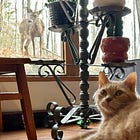Lately, I have been sitting with questions about the purpose and usefulness of stories. Specifically, the stories we tell to make sense of events that bring with them feelings of surprise. The “surprise” in question is not of the welcomed variety, by the way. There is not the same need for stories in those cases; we are perfectly happy to receive such surprises with no insight into why they happened.
Sometimes, a straightforward story, independent of its truth, suffices to dissolve the surprise. Other times, neither one nor twelve stories together can light up all that appears dark.
“Sometimes life does not give us answers, Michael. How does that sit with you?” said my first sponsor Jim P. recently.
“Not well!” I responded, and that despite Shitou Xiqian’s expression of the fundamental meaning of the Buddhadharma being tattooed on my calf, an expression that wraps mountains and waters while clouds drift through wide sky: not to attain, not to know.
Having a tattoo of something does not guarantee mastery of that something—and (surprise!) no one is surprised by that.
At other times, the absence of answers invites a pause in the storytelling and consideration of the questions: do I need a story for this situation? Can I be all right with dark places? Can I welcome Surprise’s natural companion, Not-knowing? If I can, what might I find?
There is only one way to answer these questions, of course.
Below is a poem from Wallace Stevens that brushes up against some of this. The title is “Crude Foyer.”
Wherever you are this Sunday, whatever you are doing, please find a moment to pause.
Thought is a false happiness: the idea That merely by thinking one can, Or may, penetrate, not may, But can, that one is sure to be able— That there lies at the end of thought A foyer of the spirit in a landscape Of the mind, in which we sit And wear humanity's bleak crown; In which we read the critique of paradise And say it is the work Of a comedian, this critique; In which we sit and breathe An innocence of an absolute, False happiness, since we know that we use Only the eye as faculty, that the mind Is the eye, and that this landscape of the mind Is a landscape only of the eye; and that We are ignorant men incapable Of the least, minor, vital metaphor, content, At last, there, when it turns out to be here.
Previous installments of The Sunday Paws are found below:







That poem, wow.
I often contemplate the functions of story in my life... when it serves to surface semi invisible 'truths,' when it supports me to make meaning of something if that is useful, and when it digs me into a deeper hole of reifying my ego story and thereby creates more suffering for me and possibly others. I find 'story' to be a fascinating vehicle, it can do all those things and more. Not staying awake to the stories I tell myself is a big trap. Conscious stories, though, can have healing properties....